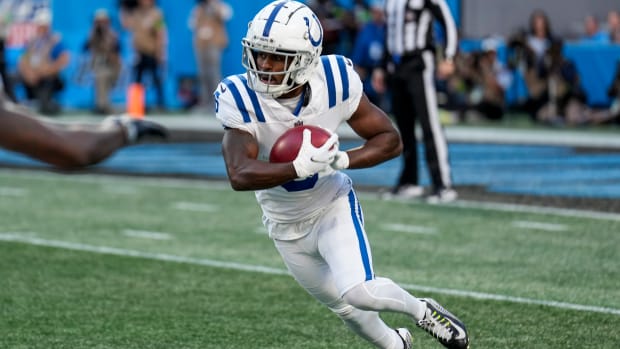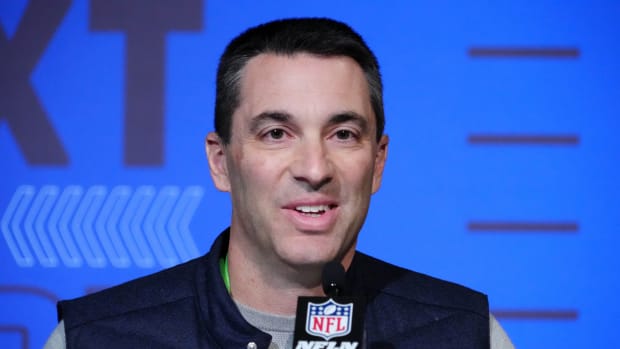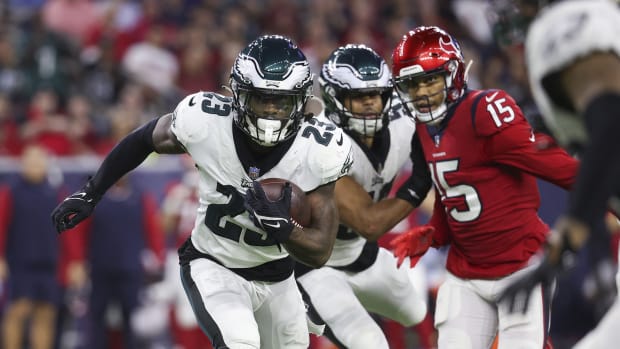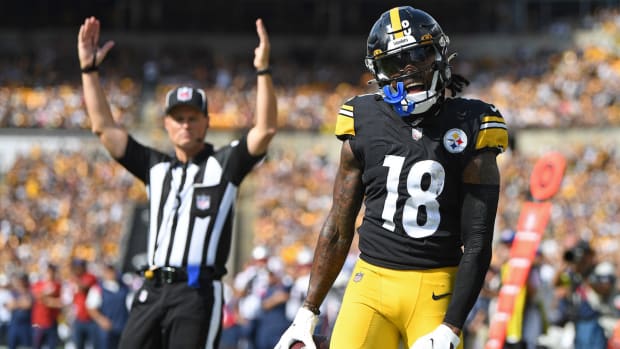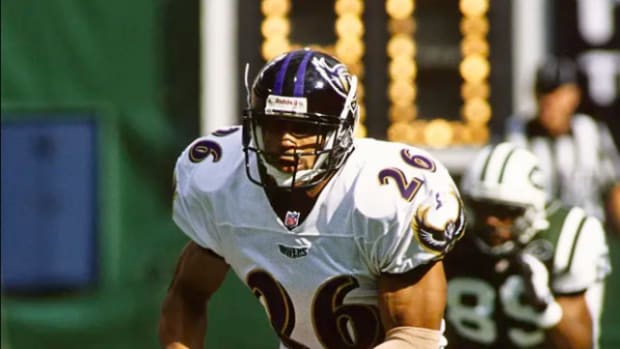The NFL’s Top 10 Offensive Linemen for 2019 | The MMQB NFL Podcast
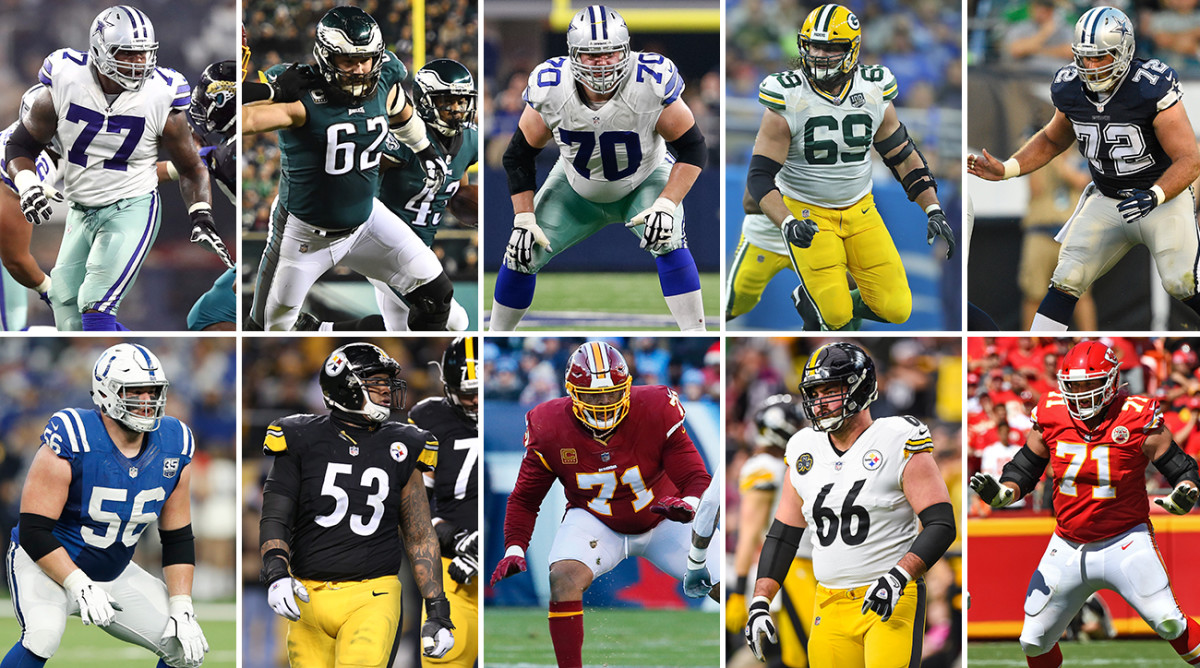
On the Monday Morning NFL Podcast, Andy Benoit and Gary Gramling discuss the state of offensive line play across the NFL, the wisdom in investing big in the front five, the true value of a center, and a Q&A with Tampa Bay Bucs left tackle Donovan Smith. Plus, they unveil their ranking of the top 10 offensive linemen in the NFL heading into the 2019 season. Listen and subscribe to The MMQB Monday Morning NFL Podcast here. The following transcript has been edited and condensed for clarity.
GARY: The question we’ll start with is this: Do you need to invest big to get star, headlining offensive lineman in the NFL? Or is the goal more—and we've talked about this a little bit over the years—just to get an offensive line that isn’t disastrously bad, that is simply good enough to allow you to function?
ANDY: Yeah, we’ve gone over this before and it’s a moving argument. I think a lot of it begins with who you have at quarterback and how you play—every offense takes on the shape of its quarterback. If you have a guy who’s getting the ball out quickly, if you’re the New England Patriots, for example, you don’t need to re-sign Nate Solder for top-end money, or Trent Brown for top-end money. You can get by with mid-round draft picks, or even an undrafted center like David Andrews, who’s gotten a lot better over time because you have a quarterback that controls the protections and gets the ball out on three- and five-step timing pretty often. But if you're the Philadelphia Eagles, for example, and theirs is kind of a quick-strike offense, but Carson Wentz tends to play late into the down within the pocket. Then it’s a different conversation. The Eagles have a lot of good offensive linemen.
ANDY: The one that complicates it for me, Gary, is the Indianapolis Colts. They are kind of somewhere in between—they've got the superstar QB, they get the ball out quickly, and yet they invested heavily in their offensive line. And I thought that was overkill. I didn't love the Quenton Nelson pick because I thought they needed more help on defense and Luck could compensate for a bad line. But there's no doubt that that offensive line in Indianapolis was the biggest reason that team looked like a contender last year, which means I was wrong about Nelson and wrong about the approach. Investing in the O-line helped them a lot. So I don’t know where I stand on this now.
GARY: And just to be clear, conceptually you didn’t like the Nelson pick, Andy. You didn’t like the Colts taking an offensive lineman. I just wanted to point that out before this turns into another out-of-context 20-second Twitter clip.
ANDY: I was fine with Nelson, the linemen that they took, but I didn't like them taking a lineman in general at that pick. And again, I was more than wrong about that one.
Subscribe to get all new episodes of The MMQB Podcast for free. The Monday Morning NFL Podcast is available to subscribers the moment you wake up every Monday morning. (For non-subscribers, there is typically a soul-crushing lag.)
GARY: So to me I think at this point investing in a great offensive line and trying to build a “good enough” offensive line is almost the same thing. That “good enough” line costs big money at this point. Nate Solder isn’t a game-changing tackle, but he was solid in New England—a little less than that in his first year in New York—and look what they had to pay for him. You can go back to the Vikings signing Riley Reiff and Mike Remmers—Remmers is probably a swing tackle. But they had to pay those guys big money.
ANDY: And Remmers was a disaster, so they wound up getting rid of him and now they’re trying it all over again with Josh Kline. But it’s like you said with Solder, the left tackles not a game changer. The problem I’ve had for a long time, and I'm just having a conversation now, is: Name one tackle that is a game-changer. Because you can’t really do much to scheme with your offensive line unless you are a super run-heavy team, and there are more teams starting to do that again. Dallas, Baltimore, all those teams should be investing in offensive linemen. But for the most part it’s a quick-strike passing NFL, and you can’t gain an advantage with your offensive linemen. All they are are insurance policies, for their pass protection. And they’re really expensive insurance policies.
GARY: Well, I would have answered your question with Tyron Smith. I would also, I guess, point out that if you look at the Texans—and it’s obvious to see the problems on their offensive line because they gave up the most sacks in football last year—but their offensive line was so bad that it changed the way they played.
ANDY: Yes, they had to accommodate it with keeping an extra blocker in, which now you’re changing your offense to make up for the fact that you don’t have five guys who can block. And your quarterback, in his second year I thought took a step back at times because he didn't trust is offensive line. Deshaun Watson played a little bit rushed in the pocket, he held the ball at times, and it's partly because the guys who would have been his eligible receivers were staying in and blocking and helping those offensive linemen who struggled. It’s like you almost need a sweet spot, like if you were to give a letter grade and C is an average offensive line, and A is a Pro Bowl offensive line, you need at least a B to run your offense.
GARY: And I feel like you have to built it through the draft at this point, almost more than any other position.
ANDY: Here’s the challenge that comes with that. Let’s say the lineman is talented but he’s not quite ready to play mentally. Well, you can’t have that at the offensive line. You have to react to immediate pressure and pressure designs, and defensive fronts are getting more creative by the week in the NFL. It takes a lot of intelligence to play offensive line. There was a stereotype many years ago that it was just big dumb meatheads, but offensive linemen, next to quarterbacks, they're the smartest players on the field almost always. Especially as you move inside, the center position and even some of the guard positions where you get a lot of bodies around you.
ANDY: So yeah, you draft them because they’re so expensive in free agency, which is happening at other positions. But you’ve got to have a guy that can also be counted on, mentally, right now. And you know what, Gary, there's a reason offensive line coaches tend to be the highest-paid assistants on every staff, next to coordinators. And there's a reason that once you’re an offensive line coach that’s pretty much where you stay, because when the team finds a good one, they grab on to that guy. You need teachers in that role.
THE MMQB PODCAST TOP 10 OFFENSIVE LINEMEN FOR 2019
“Others receiving votes” is included if you listen to the show, along with more offensive line discussions including whether or not to spend big on the O-line, the value of the center position, and a Q&A with Tampa Bay Bucs left tackle Donovan Smith. Position ranking voting is AP Poll-style among three panelists, with Andy’s votes counting double:
1. Zack Martin, G, Dallas, 78 points (2 first-place votes)
2. David Bakhtiari, OT, Green Bay, 75 (1)
3. Jason Kelce, C, Philadelphia, 69
4. Tyron Smith, OT, Dallas, 58
5. Travis Frederick, C, Dallas, 56
6. Quenton Nelson, G, Indianapolis, 52
7. David DeCastro, G, Pittsburgh, 51
8. Mitchell Schwartz, OT, Kansas City, 48
9. Maurkice Pouncey, C, Pittsburgh, 47
10. Trent Williams, OT, Washington, 44
• Question or comment? Email us at talkback@themmqb.com.

































